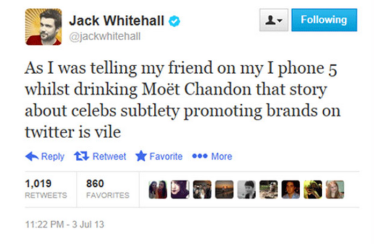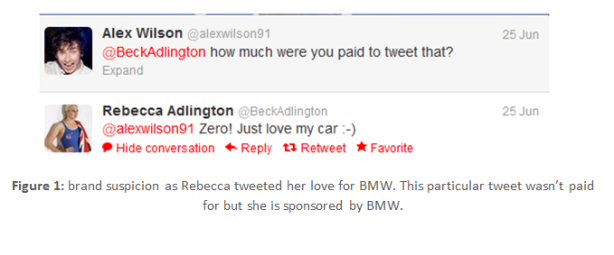Business Ethics: Endorsements are a Treacherous Path.
“Social-media-ad spending is expected to reach a total of $4.8 billion at the end of 2012 and $9.8 billion by 2016″. Bloomberg
The use of social media by companies to market their brand is one of the most successful ways to receive maximum publicity with a minimal budget. No matter what the business, people want to be in the know and that involves knowing what others think. However, the ethics surrounding online reviews and endorsements can be a grey area. This post is limited to two examples: paying for coverage on YouTube and celebrity endorsements on Twitter. However, the general ethical guidelines apply to all areas of social media reviews/endorsements.
In a recent interview Kelly McBride, the author of The New Ethics of Journalism, discussed the complex ethics surrounding paid endorsements on YouTube. She also discussed the value of transparency and credibility – a business lacking transparency is at risk of losing credibility (similar theme to Topic 3). However, these values do not simply apply to YouTube but to all reviews on social media. As such, the motives behind a product endorsement must be clear, as they will undoubtedly influence how the reader judges the information provided (Rose, 2014). Vloggers in particular often come under fire for breach of ethical codes. A recent article describes an incident whereby Vloggers were said to have broken the law after participating in a sponsored campaign promoting Oreo biscuits.
From previous blog topics, it is clear that legally monitoring social media can be difficult. However, the Federal Trade Commission (FTC) is an independent agency of the U.S. government that fights for the protection of consumers. They have introduced standards to ensure that if an advertiser or a marketer is paying someone to write favourable reviews, they should clearly disclose this information to the viewer (FTC, 2013).
 The same principles apply to celebrities who endorse products on Twitter. The FTC explains that if a celebrity fails to use the #ad or #spon, both the advertiser and endorser may be liable. The Advertising Standards Authority UK has similar guidelines (Gibson, 2014). However, despite these authorities’ guidelines, social media will always be difficult to regulate due to the various ‘grey areas’ surrounding online marketing (Varney, 2013).
The same principles apply to celebrities who endorse products on Twitter. The FTC explains that if a celebrity fails to use the #ad or #spon, both the advertiser and endorser may be liable. The Advertising Standards Authority UK has similar guidelines (Gibson, 2014). However, despite these authorities’ guidelines, social media will always be difficult to regulate due to the various ‘grey areas’ surrounding online marketing (Varney, 2013).
This great Slideshare, discusses the laws regarding social media marketing and provides examples of endorsements conducted in the right and wrong manner.
It’s clear that often viewers are unaware of the nature of endorsements and reviews. If viewers are informed, they may carry out different actions. Nonetheless, it must be noted that this is an exceptionally broad topic with many interesting view points.
FTC (2013) .com Disclosures: How to Make Effective Disclosures in Digital Advertising, Federal Trade Commission.
Gibson, W. (2014) Celebrity spokespersons and the federal trade commission, Social Media Explorer.
Rose, M. (2014) Pay for Play: The ethics of paying for YouTuber coverage, Gamasutra.
Varney, C. (2013) Celebrity Twitter Ads: Regulations, Allegations and Selling Out, Brandwatch.
|
|


